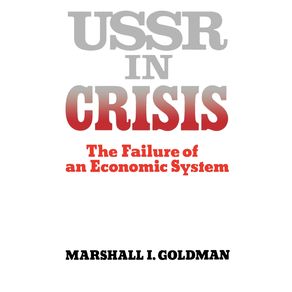| Origem | Literatura Estrangeira |
|---|---|
| Quantidade de Páginas | 232 |
| Acabamento | Capa Dura |
| Autores | Robert E. Wright |
| Idioma | Inglês |
| Edição | 0 |
| Selo | Rowman & Littlefield Publishing Group Inc |
 Os generais de Hitler
Os generais de Hitler
Companhia das Letras
R$ 149,90 ou até 2x sem juros Etna
Etna
Alpha Editions
R$ 100,05 ou até 2x sem juros Essentials of Economic Theory; As Applied to Modern Problems of Industry and Public Policy
Essentials of Economic Theory; As Applied to Modern Problems of Industry and Public Policy
Alpha Editions
R$ 134,81 ou até 2x sem juros The Digest of Justinian, Volume 2
The Digest of Justinian, Volume 2
University of Pennsylvania Press
R$ 275,16 ou até 3x sem juros The African Roots of Marijuana
The African Roots of Marijuana
Duke University Press
R$ 246,89 ou até 3x sem juros On Decoloniality
On Decoloniality
Duke University Press
R$ 235,85 ou até 3x sem juros Servants of Nature
Servants of Nature
W. W. Norton
R$ 186,00 ou até 3x sem juros Clocks and Culture 1300-1700
Clocks and Culture 1300-1700
W. W. Norton
R$ 122,70 ou até 2x sem juros Kennedy Tapes
Kennedy Tapes
W. W. Norton
R$ 200,36 ou até 3x sem juros Dimensions of a New Identity
Dimensions of a New Identity
W. W. Norton
R$ 116,77 ou até 2x sem juros Moral Values and Political Behaviour in Ancient Greece
Moral Values and Political Behaviour in Ancient Greece
W. W. Norton
R$ 130,52 ou até 2x sem juros The Marxian Revolutionary Idea
The Marxian Revolutionary Idea
W. W. Norton
R$ 140,56 ou até 2x sem juros Science and the Founding Fathers
Science and the Founding Fathers
W. W. Norton
R$ 148,50 ou até 2x sem juros The Enlightenment
The Enlightenment
W. W. Norton
R$ 231,85 ou até 3x sem juros War and Human Progress
War and Human Progress
W. W. Norton
R$ 177,93 ou até 3x sem juros First Templar Nation
First Templar Nation
Freddy Silva
R$ 173,92 ou até 3x sem juros So Far from God
So Far from God
University of Oklahoma Press
R$ 178,73 ou até 3x sem juros When Scotland Was Jewish
When Scotland Was Jewish
McFarland and Company, Inc.
R$ 369,57 ou até 3x sem juros Essentials of Economic Theory; As Applied to Modern Problems of Industry and Public Policy
Essentials of Economic Theory; As Applied to Modern Problems of Industry and Public Policy
Alpha Editions
R$ 134,81 ou até 2x sem juros A Discourse on Trade And Other Matters Relative to it
A Discourse on Trade And Other Matters Relative to it
Alpha Editions
R$ 97,23 à vista Michael Wittmann & the Waffen SS Tiger Commanders of the Leibstandarte in WWII, Volume 2, 2021 Edition
Michael Wittmann & the Waffen SS Tiger Commanders of the Leibstandarte in WWII, Volume 2, 2021 Edition
Rowman & Littlefield Publishing Group Inc
R$ 161,78 ou até 3x sem juros Écrits de guerre
Écrits de guerre
Omnia Veritas Ltd
R$ 178,07 ou até 3x sem juros The Digest of Justinian, Volume 1
The Digest of Justinian, Volume 1
University of Pennsylvania Press
R$ 275,35 ou até 3x sem juros Theft Is Property!
Theft Is Property!
Duke University Press
R$ 230,75 ou até 3x sem juros USSR in Crisis
USSR in Crisis
W. W. Norton
R$ 155,95 ou até 3x sem juros Remembering Survival
Remembering Survival
W. W. Norton
R$ 162,77 ou até 3x sem juros Naming Nature
Naming Nature
W. W. Norton
R$ 147,70 ou até 2x sem juros In Search of Enemies
In Search of Enemies
W. W. Norton
R$ 155,82 ou até 3x sem juros Architectural Principles in the Age of Humanism
Architectural Principles in the Age of Humanism
W. W. Norton
R$ 132,51 ou até 2x sem juros Science and the Founding Fathers
Science and the Founding Fathers
W. W. Norton
R$ 148,50 ou até 2x sem juros First Templar Nation
First Templar Nation
Freddy Silva
R$ 173,92 ou até 3x sem juros Discoveries among the Ruins of Nineveh and Babylon
Discoveries among the Ruins of Nineveh and Babylon
Alpha Editions
R$ 133,90 ou até 2x sem juros Greek History
Greek History
Moliva AB
R$ 183,82 ou até 3x sem juros The Digest of Justinian, Volume 1
The Digest of Justinian, Volume 1
University of Pennsylvania Press
R$ 275,35 ou até 3x sem juros The Digest of Justinian, Volume 3
The Digest of Justinian, Volume 3
University of Pennsylvania Press
R$ 275,25 ou até 3x sem juros Clocks and Culture 1300-1700
Clocks and Culture 1300-1700
W. W. Norton
R$ 122,70 ou até 2x sem juros Chinese Roundabout
Chinese Roundabout
W. W. Norton
R$ 162,81 ou até 3x sem juros Remembering Survival
Remembering Survival
W. W. Norton
R$ 162,77 ou até 3x sem juros Schnitzlers Century
Schnitzlers Century
W. W. Norton
R$ 148,31 ou até 2x sem juros Dimensions of a New Identity
Dimensions of a New Identity
W. W. Norton
R$ 116,77 ou até 2x sem juros Architectural Principles in the Age of Humanism
Architectural Principles in the Age of Humanism
W. W. Norton
R$ 132,51 ou até 2x sem juros The Marxian Revolutionary Idea
The Marxian Revolutionary Idea
W. W. Norton
R$ 140,56 ou até 2x sem juros With MacArthur in Japan
With MacArthur in Japan
W. W. Norton
R$ 140,66 ou até 2x sem juros The Enlightenment
The Enlightenment
W. W. Norton
R$ 231,85 ou até 3x sem juros Nuclear Weapons and Foreign Policy
Nuclear Weapons and Foreign Policy
W. W. Norton
R$ 154,55 ou até 3x sem juros